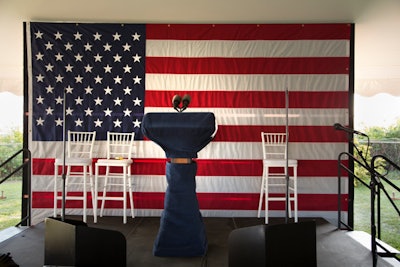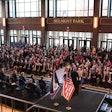
David Adler (@DavidAdler) is C.E.O. and founder of BizBash.
On August 21, a talented group of event professionals gathered in New York to hear views on our industry from City Council Speaker and mayoral hopeful Christine Quinn, one of the first candidates to recognize the power of the event community. Although billed as a typical fund-raiser and roundtable discussion, I saw it as evidence the event and meeting industry is becoming a fully vested member of the business community with recognized power, prestige, and proven economic impact.
Event hosts Bronson van Wyck and Jennifer Blumin came prepared to suggest the new mayor have an event industry task force to advise on issues and create new initiatives to help make New York—known to some as the event capital of the world—even more effective. Everyone, including Quinn, felt it was a great idea.
In fact when van Wyck, a prominent designer and producer, called Quinn to explain how vital and essential events and meetings are to the city’s economy, and offered to host industry leaders for a discussion, she jumped at the opportunity and was extremely sympathetic. I believe this is because all politicians are really event organizers. As part of their craft they understand personally how policies and regulations are not designed to accommodate such a vibrant and growing business sector.
Amplified by traditional and social media, the emotional impact of events as marketing, collaboration, and training tools has implications in New York and around the world. With more than $6 billion in economic influence, including more than 2,400 individual venues and 1,400 vendors in New York alone, we rival other major industries and deserve to be heard.
Attendees—including producers J.B. Miller and Keith Baptista, wedding planner Marcy Blum, lighting designer Ira Levy, and caterer Peter Callahan—mentioned they were working on events with multimillion-dollar budgets that will have a huge impact on the economy.
The gathering brought to light how difficult it is to produce elaborate events within antiquated rules and regulations designed by people who have never produced an event. Logistical hurdles like permit and license nightmares were presented repeatedly to Quinn, with many pointing out that such problems have been addressed for other industries, including film and restaurants. Now it’s time to step up for the event industry.
During the roundtable, we also discovered this could be the perfect opportunity for a public-private partnership that could bring new business to the entire city by creating or recruiting new events, especially in the shoulder seasons that need to be filled.
After September 11, 2001, a group of event professionals created C.E.M.E., the Convention, Exhibition, Meeting, and Event Coalition, as a way to use our collective clout to help restore the city. This included taking over Gracie Mansion and producing events for specific groups; designing award programs on Harbor Cruise ships to thank the companies for sticking with New York and not canceling their programs (thank you, Microsoft); creating cascading emails convincing out-of-town groups that New York was indeed open for business; and even convincing Snapple to host a group sales meeting at the Empire State Building by illuminating the skyscraper in the brand’s signature yellow during the event. Through this, I learned that the event industry owns the infrastructure of New York.
After the discussion with Quinn, a group of us thought, why wait? We want to work with whoever becomes New York City’s next mayor. We want to start an industry task force immediately to address some of the pertinent issues at hand. "It's important for the administration, no matter who ends up living in Gracie Mansion, to recognize this and to understand the ways that the city can play a positive role by enabling us to do our work," says van Wyck.
We believe this is a great model for all event cities and are willing to help anyone create a template for moving this initiative ahead in their own market.
With actions like this, we can ensure that we are no longer sitting at the children’s table, but instead have a seat with real decision makers.
If you are interested in getting involved, click here.
The committee at the August 21 meeting included:
Keith Baptista, partner and managing director, Prodject
Marcy Blum, owner, Marcy Blum Associates
Jennifer Blumin, founder and president, Skylight Group
Peter Callahan, owner, Peter Callahan Catering
Alan Gottlich, executive vice president, Party Rental Ltd.
Terry Gruber, owner, Gruber Photographers
Dirk Hettrich, president, Perception Audio-Visual Services
Dan Kobin, owner, Center548
Elliot Krowe, C.E.O., BML-Blackbird Theatrical Services
Ira Levy, owner, Levy Lighting
Kevin Mignone, president, KM Productions
J.B. Miller, C.E.O., Empire Entertainment
Steve Paster, owner, Alpine Creative Group
Valerie Romanoff, owner, Starlight Orchestras and Productions
Louis Rose, owner, Rose Group
Laura Smaragdakis, vice president, GSS Security Services
Bob Spiegel, co-owner, Pinch Food Design
Chris Starr, president, Starr Tent
Bronson van Wyck, founder, Van Wyck & Van Wyck
Ellen Weldon, owner, Ellen Weldon Design



















